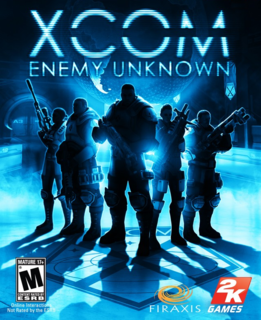X-Com simplifies many aspects of the originals, but this works both for and against it.
On the "pro" side of the scale, X-Com is definitely a beautiful and streamlined game. For starters, it has far better graphics than we've seen in any Turn Based Tactical games over the years. I especially liked the way Firaxis used 3D cameras without making it impossible to see what's going on - something that most developers struggle with greatly. Furthermore, the sleek designs and smooth animations manage to modernize the original's cartoonish 2D alien monsters without making them look like goofy or over-pumped 3D versions of themselves. Most of the gameplay as well as the enemy combatants are instantly recognizable to players of the original game.
Sadly, streamlining also took place in parts of the game that did not need it. In particular, the geoscape (world map) portion of the game has been simplified to the point where it feels like the game is making choices for you where it really shouldn't. Things like having only one skyranger (landing craft) regardless of how many soldiers you have, so you are forced to choose which alien attack to respond to, the inability to send multiple interceptors against one target, the inability to create additional bases around the globe - these sound like trivial things when in practice they make the game extremely linear, and add a "fake difficulty" element that is quite frustrating.
Of course no review of this game is complete without discussing the new tactical system, which is very different from the original game. Action Points have been replaced by allowing each soldier to make two actions per turn, usually one move of pre-defined distance and one attack. Soldier equipment choice is almost nonexistent. Most of the action revolves around analyzing and utilizing available cover, and coming up with creative solutions where cover is sparse. This tends to make battles a little more repetitive than they were in the original game, though admittedly they can still be quite tense and engaging.
Another sad point regards the role-playing elements. Soldiers now have "Classes", and gain bonus abilities as they gain ranks. With a very small number of abilities that are actually useful, and only about two or three attributes that differ from one soldier to the next, it feels like your soldiers eventually become cookie-cutter copies of one another. With only 6 soldiers being allowed out on any mission (compared to the original's 20+ soldiers later in the game), variety suffers and things start getting a little repetitive. It helps that soldiers are customizable so that you can grow attached to them - but in a game where soldiers die like flies that sort of attachment leads to a lot of frustration.
Finally, a word about difficulty: This game is extremely hard, in keeping with the originals. However, it feels like the difficulty is, in many places, just fake. If you make one wrong decision in the strategic portion of the game, you could lose the entire game - and often the game gives you no warning that what you're about to do may not be a good idea, and can waste you hours of playing time before you realize you're in a strategic dead-end. It can take just one or two countries dropping out of the X-Com project to dwindle your resources enough that the remaining countries cannot be effectively protected. To finish the campaign without failing, it's almost required to "meta-game", expecting certain events to occur at specific times and being ready for them in advance.
In summary, X-Com is a great game in general terms, and successfully revives a genre that has received very little investment from developers over the past decade or so, and that's a good thing. On the other hand it is just plain less interesting than its predecessors, and has a strong dichotomy between holding your hand (limiting your choices to make the game simpler to play) and stacking the odds against you (fake difficulty). It's worth playing, but don't expect it to stay at the top of the all-time PC classics chart like the original X-Com has for so many years.

